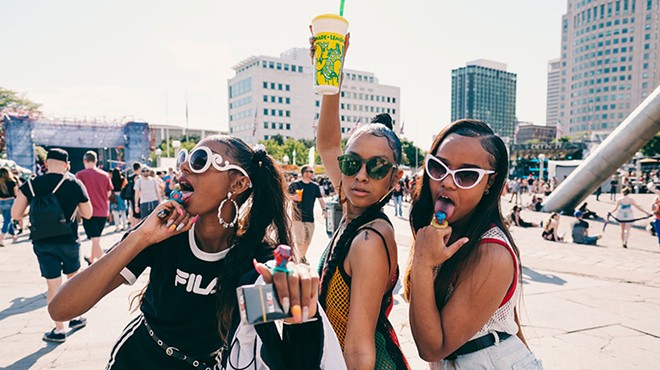It's a long way from techno's political early history.
Pitchfork ran an interesting longread last week titled "Electronic Warfare: The Political Legacy of Detroit Techno" that took a closer look at the militant, inner-city history of techno and the "cultural smudging" that happened after, focusing in particular on pioneers like Underground Resistance.
Author Andy Beta writes about attending a recent lecture by UR founding member Robert Hood:
Hearing about techno as it was originally conceived—as a reaction to inner-city decay, as byproduct of African-American struggle, as a form of protest — served as a crucial reminder of the roots of this dance music, and that the name Underground Resistance was in no way a euphemism, but a reality. To the outsider — in this writer’s case, a white teen from the suburbs of Texas — it might be hard to conceive of the oft-wordless techno as revolutionary music; by the time I started hearing it in the early ‘90s, it certainly wasn’t the relentless sound of Underground Resistance. At that nascent stage, Detroit techno (and Chicago house) was being packaged and presented as the smiley-face music of Berlin, Madchester, and Belgium — the sound of Europeans and Ecstasy. Rather than Marshall Jefferson’s “Move Your Body”, my generation was instead indoctrinated with its Belgian rewrite, Technotronic’s “Pump Up the Jam”. Even then, techno’s blunt force was being lightened.
“Struggle” isn’t the descriptor that springs to mind when thinking of the genre in 2015, as techno has since become more commonly known for its hedonism and excesses, and its multi-billion-dollar machinations. Look again at Robert Hood’s rank at #44 on Resident Advisor’s Top DJs of 2014 Readers Poll and then notice the lack of African-American faces that appear higher up the list. Or as Carter put it when he regarded those same lists: “Show me the gay brown faces—Shit! Show me EITHER the gay or brown faces — and then discuss ‘cultural smudging.’”
Read the whole article at Pitchfork here — and while you're at it, dig back into the MT archives to when UR offshoot Timeline played last year's Movement here, and when UR played a rare live show in 2004 here.







